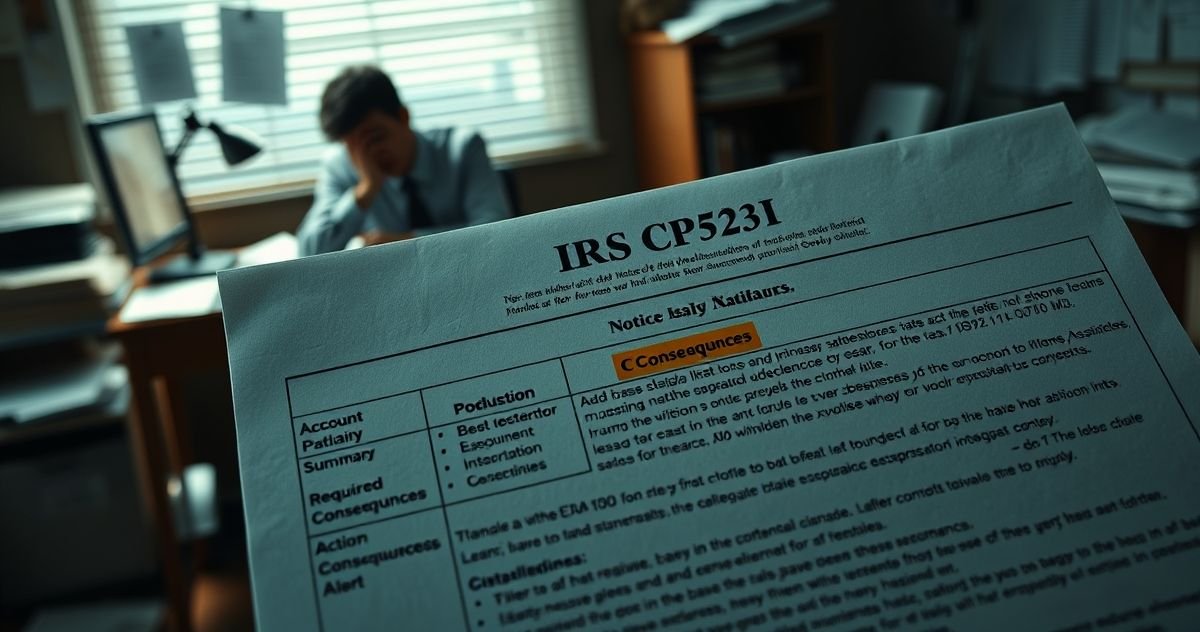Understanding the IRS CP523I Notice: Essential Details for Taxpayers
The CP523I Notice is a specific communication tool used by the Internal Revenue Service (IRS) to address taxpayers involved in installment agreements. Understanding the contents and implications of this notice is vital for taxpayers who are looking to maintain compliance and avoid financial penalties.
What is a CP523I Notice?
The CP523I Notice is sent to individuals or entities currently under an installment agreement with the IRS. This notice is triggered when there are changes or issues with their existing payment plans. Distinct from other tax notices, the CP523I is directly related to installment agreements, often relating to missed payments or adjustments that need immediate attention to prevent termination of the agreement.
Primary Purpose of the CP523I Notice
The primary purpose of the CP523I Notice is to alert taxpayers about important changes or problems related to their installment plan. Whether it is a missed payment, a change in terms, or another discrepancy, the notice serves to prompt immediate corrective action.
Key Features and Components of the CP523I Notice
- Account Information: Details about the taxpayer’s IRS account, including outstanding balances and recent payments.
- Issue Description: Specifics on what triggered the notice, such as a missed payment or amended agreement terms.
- Action Required: Steps the taxpayer must take to rectify the issue, such as making a missed payment or updating financial information.
- Consequence Notification: Potential consequences if the taxpayer fails to act, such as termination of the installment plan and escalation of collection actions.
Compliance and Filing Requirements
Taxpayers who receive the CP523I Notice must ensure compliance with the terms outlined in their installment agreement. Generally, this means ensuring timely payments and accurate financial disclosures. Upon receiving a CP523I Notice, a taxpayer is generally required to:
- Review the notice thoroughly to understand the discrepancy or change.
- Contact the IRS immediately if there are questions or misunderstandings regarding the notice content.
- Make necessary payments or adjustments by the deadline specified in the notice.
- Consider renegotiating their installment plan terms if changes to financial conditions have occurred.
Penalties or Consequences for Non-compliance
Failure to address the issues highlighted in a CP523I Notice can lead to serious consequences. Some potential outcomes include:
- Termination of Installment Agreement: The IRS may cancel the installment agreement, requiring immediate payment of the total debt.
- Increased Financial Penalties: Accumulated interest and penalties for non-compliance can significantly increase the total amount owed.
- Collection Activities: If unresolved, the IRS may pursue vigorous collection actions including wage garnishments and levies on bank accounts.
- Credit Impact: Unpaid tax debts can negatively affect credit scores and borrowing capabilities.
Importance of the CP523I Notice in Financial Compliance
The CP523I Notice plays an essential role in helping taxpayers maintain financial compliance. By addressing inconsistencies in installment agreements promptly, taxpayers can:
- Maintain their eligibility for installment plans, thereby avoiding the full burden of paying large sums at once.
- Protect themselves from increasing debt due to accumulated penalties and interest.
- Avoid enforcement actions that could disrupt personal or business finances significantly.
- Possibly renegotiate more favorable terms if financial situations have changed, provided the IRS receives prompt communication.
Conclusion
The IRS’s CP523I Notice is a crucial document that requires immediate attention and action. Failing to understand and respond appropriately can result in terminated agreements and escalating financial liabilities. For taxpayers involved in installment payments, staying informed about and adhering to IRS communications like the CP523I Notice is vital for maintaining financial health and compliance. With proactive management and understanding of the details within this notice, taxpayers can avoid unnecessary financial strain and continue on a path to fulfilling their tax obligations successfully.

